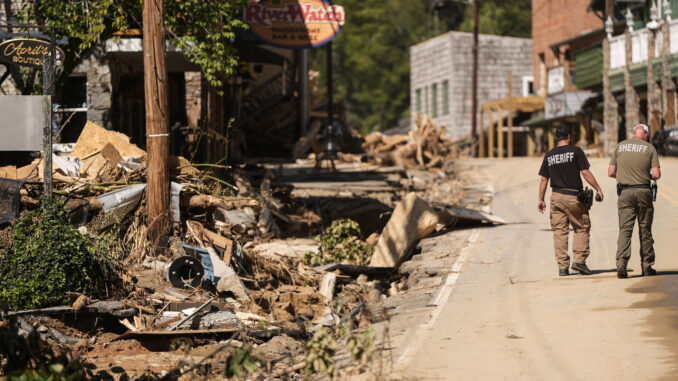
As Western North Carolinians, shocked by the devastation of Hurricane Helene that left countless homes destroyed, lives shattered and even entire towns eviscerated, many wonder how and when those affected will pick up the pieces.
While assuming flood insurance is the obvious first step, the unfortunate fact is an overwhelming number of homeowners aren’t covered.
“When disasters like this occur, you do find that a lot of people are uninsured,” said Franklin Rouse, president of Rouse Insurance Agency Inc. “And if they do have flood insurance, the policies are usually thin.”
The risk of severe flooding in the mountains is low. By no fault of their own, homeowners can assume a sense of ease and default complacency based on the infinitesimal probability of high water in an elevated region. It’s also easy for real estate agents, mortgage lenders and banks to tell homebuyers flood insurance isn’t necessary.
“‘You’re not in a flood zone’ is a dangerous term,” Rouse warned. “You could stand at the top of Mount Mitchell or have your toes in the sand, Mother Nature doesn’t know or care.”
In 2004, the damaging remnants of hurricanes Ivan and Jeanne triggered some in western N.C. to participate in The National Flood Insurance Program, or NFIP. Still, the low risk factor has kept most in the area seeing coverage as essential.
“Many people think, ‘I’m on the side of a mountain, I’m never going to have to worry about rising water,’” said flood insurance expert Charlotte Hicks. “I would expect the majority do not have flood insurance.”
The maximum coverage you can buy for a home or dwelling through NFIP, which is part of the Federal Emergency Management Agency (FEMA), is $250,000. If your home or dwelling is in a regulated flood plain or special hazard zone, flood insurance is mandatory.
“But that doesn’t cover critical costs such as additional living expenses, lodging elsewhere; it can be very expensive,” Rouse said.
Two years ago, a geospatial study by a doctoral candidate at NC State found that 84.5% of flood damage losses occurred outside regulated flood plains or special hazard flood areas. Still, because homebuyers in regions like western N.C. are not in a designated flood plain, flood insurance is optional. “People think they don’t have a risk, and it’s not true at all,” Hicks said.
Both Hicks, an expert on flood insurance in North Carolina, and Rouse, who is based in Wilmington, expressed an urgent message of education, preparedness and mitigation to homeowners.
“Flood maps are available to the public,” Hicks said. “Everybody needs to be educated about their risk, and each individual needs to decide for themselves with all the facts. The information is out there.”
On the real estate transaction side, Rouse added, “Everyone involved needs to inform buyers about flood insurance and the risk to their property in close proximity to lakes, rivers, ponds or otherwise. Again, Mother Nature doesn’t know flood plains begin and end.”
Faced with the unknown and the strong likelihood of rebuilding without flood insurance or, at best, the maximum coverage, those in washed-away communities like Chimney Rock and ravaged parts of Asheville, Black Mountain and Hendersonville are left to fend for themselves. As private home insurance plans generally only cover wind damage from hurricanes, Helene victims will need assistance from federal agencies, charities and private donations to rebuild their communities.
